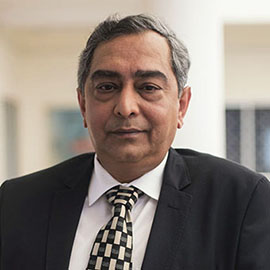Prof. Dr. Partha Pratim Das

Dr. Partha Pratim Das is a Professor at the Department of Computer Science and the Founding Director of the Center of Data Science and Analytics at Ashoka University. He has over 24 years' experience in teaching and research, and about 13 years' experience in Software Industry. He has worked extensively in Digital Geometry, Smart Software Engineering, and Digital Heritage for academic research; and EDA frontend automation and T & M tools in video technology as industrial products. His current interests are Food, Nutrition and Digital Health. In Ashoka, Partha leads the initiative on Ashoka Datalake to host research data for climate, health, social and physical sciences and others, and anchors the project on “Indian food knowledge graph for personalized digital health” in collaboration with Trivedi School of Biosciences at Ashoka and Institute of Future Health @ UCI.
Earlier, Partha had been involved in R & D and education on impact projects using huge volumes of integrated and curated data and tools of AI. From 2015 to 2022, he initiated and led the National Digital Library of India Project of Ministry of Education to create an open educational library having about 100 million+ free contents organized by educational needs of the users. Partha has guided over a dozen doctoral theses and has published over 100 technical papers.
Earlier, Partha had been involved in R & D and education on impact projects using huge volumes of integrated and curated data and tools of AI. From 2015 to 2022, he initiated and led the National Digital Library of India Project of Ministry of Education to create an open educational library having about 100 million+ free contents organized by educational needs of the users. Partha has guided over a dozen doctoral theses and has published over 100 technical papers.
Prof. Dr. Ramesh Jain

Ramesh Jain is a distinguished entrepreneur, researcher, and educator, currently serving as the Emeritus Donald Bren Professor and founding Director of the Institute for Future Health at the University of California, Irvine. With a rich research background spanning control systems, computer vision, artificial intelligence, and multimedia computing, his current endeavors focus on revolutionizing health through cybernetic principles, leveraging advancements in sensors, mobile technology, processing, AI, and storage solutions. A recognized leader in his field, Jain is a Fellow of AAAS, ACM, IEEE, AAAI, IAPR, and SPIE.
His entrepreneurial journey includes co-founding several tech companies, steering them through their formative phases before transitioning them to professional management. Jain thrives on confronting new challenges, employing technology as a tool for solutions, particularly in his latest quest: devising innovative ways to enhance longevity and improve health quality. His work embodies a commitment to tackling some of the most pressing technical challenges of our time, making significant strides towards a future where good health and longevity are within everyone's reach.
His entrepreneurial journey includes co-founding several tech companies, steering them through their formative phases before transitioning them to professional management. Jain thrives on confronting new challenges, employing technology as a tool for solutions, particularly in his latest quest: devising innovative ways to enhance longevity and improve health quality. His work embodies a commitment to tackling some of the most pressing technical challenges of our time, making significant strides towards a future where good health and longevity are within everyone's reach.
Prof. Dr. George Dedoussis

George Dedoussis is a Professor of Molecular Genetics and Nutrigenetics at the Department of Nutrition and Dietetics of Harokopio University in Athens. He received his Bachelor degree in Biology from the University of Patras, MSc degree from the University of Compiegne, PhD from the Medical School of Athens and has worked as a researcher on a Fulbright scholarship at 'Harvard University'. Having an h-index of 107, he was nominated among the most cited scientists worldwide during the last decade.

